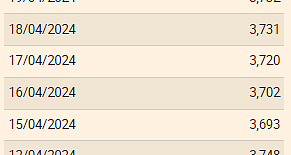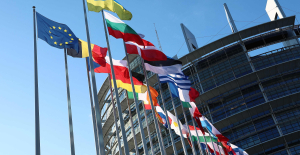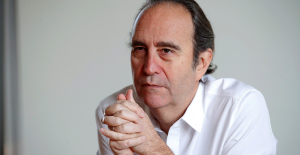In a Bunker of the Soviet air defense near Moscow on 26. In September 1983, shortly after midnight, sounded the Alarm. The Computer reports that a nuclear missile from the U.S. state of Montana on the way to the Soviet Union. According to the Protocol of the Soviet leadership now has 28 minutes to decide on a nuclear strike. It commander Stanislav Petrov is at the Top of the to transmit the message to the military leadership. The assumes that the message will result in the immediate firing of Soviet nuclear missiles on the United States – with the aim of total annihilation of the attacker.
But Petrov does not report the incident. A short time later, four more nuclear missiles are reported, with the same goal. But now Petrov is not picks up the telephone handset. The time, a counter-attack to initiate is scarce; in a few minutes, it must be expected that the rockets take on Soviet soil. But you don't do it. The Alarm has proved to be a false alarm.
The distrust with which the world is saved
talk Only after the end of the Cold war, Petrov can be seen in the documentary The Man Who Saved the World about this incident. Asked about his reasons, the messages about American rocket fire, to hold back, he be in the first place mistrust against the Computer. What if the Computer made a mistake? Petrov tried to win with other technical resources for additional information. On the satellite images, the missiles were not to be seen, which, however, could also be due to the prevailing light conditions. Secure Knowledge was to only have to be seen to the price, until the missiles appeared on Soviet radar screens – or not.
Petrov decided to use this secure Knowledge, and thus against the possibility of an immediate nuclear counter-blow, as it was required in Soviet military doctrine. Thus, a further Form of mistrust through: distrust of the System. This mistrust is named by Petrov in the Film accurately. What sense can it have to trust a System that pulls the extinction of all life on the world into consideration? It is a distrust of the military logic that has been shaped in times of the Cold war, both the Soviet Union and the United States. Only this mistrust has allowed Petrov to rise over raison d'état, and military doctrine. Without this mistrust, we would not live today maybe.
Artificial distrust
The use of technology in the world, and thus the shift of decision competencies in the field of Artificial intelligence is progressing. The Blurring of the line between man and machine generates discomfort, which is hard to predict learning processes of robots make it suspicious whether the hierarchical relationship between humans and robots is to be maintained: Who knows, in the future, who?
in addition to artificial intelligence, the latest communication technologies to distrust also the reason that provide this numerous options for the Manipulation of processes of Opinion-making. So the Russian government is accused of supporting hackers who have operated by means of false accounts on social media opinion-making for the conservative presidential candidate Donald Trump, and deliberately false reports disseminated. Moreover, Russia is said to operate on a Troll factory in St. Petersburg, from the Social Media portals such as Facebook or the comment areas of large messages to be fed portals on a daily basis with the Kremlin-friendly content.
countries like Saudi Arabia learn from Russia and send trolls into the field. As, for example, in the summer of 2018, the canadian government of Saudi Arabia is criticized for the detention of the women's rights activist Samar Badawi, started the Saudi Royal house is a Shitstorm on Twitter. In countless Tweets, the same is to be read: "In Saudi Arabia we care about the cultural genocide, the Canada indigenous people perpetrated. We also support the right of Quebec to become an independent state.“ American companies such as Google, by contrast, are behind the creation of seemingly civil-society groups, the mass emails and Tweets to the politicians to send, in order to prevent Copyright laws that could have an impact for Google a disadvantage.
distrust as a political tool
It seems that would be worked by various sides from, the credibility of political and civil society institutions to undermine. Who is familiar and who distrusts, is more often a matter of political opinion than of fact-based decision-making. Distrust is being exploited and made a means of political struggle.
And so rocks mistrust high. Worldwide, surveys show that mistrust of corporations, governments, non-governmental organisations and the media grows. There are plenty of scandals and crises have their share, including the global banking and financial crisis, the Euro crisis, the Diesel-scandal and the NSA surveillance affair. To complement the still incomprehensible tangle of constitutional protection in the deeds of the NSU or the unexplained death of Oury Jalloh in a police cell in Dessau, Germany would be for Germany.
distrust is also driven in a targeted manner. This Firing is part of an Agenda that can be summarised under the catchword "post-factual". A key Protagonist of the US President, Trump. Not only that, Trump out of his distrust against unpopular media makes no secret of it; he calls this distrust of his citizens, he referred to the media as a "Fake News". In the process, Trump used in his numerous Tweets, with numerous untruths and also contributes to the Erosion of the Factual. Some suspect that his goal was the border between fact and falsehood, or between Trusted and not Trusted to recognition. Left Irritation and confusion remained a state that is ideal for indoctrination.
What democracies are measured
In his novel 1984, George Orwell introduced the effect of such a Propaganda to the point: you should not teach the citizen, "to trust in the knowledge of his eyes and ears." The politically desired and promoted distrust in their own abilities to be compensated with an absolute trust in the government. This kind of absolutely set the distribution of trust and distrust is characteristic of dictatorships. Through the representation of political action as "without alternative" and the political Ostracism of distrust in state actors such as the police or border guard are also democracies like the Federal Republic, however, susceptible to a discrediting of mistrust on behalf of the political authority.
Any democracy must ultimately be measured by how much the distrust of its citizens to allow, and observed. In the current Situation, which is characterized by the discursive devaluation of distrust, would governments be well-advised to recall the constitutive role of distrust for the preservation and strengthening of democracy in memory. And clearly, in which calamities led to the so-often called suspension of mistrust in the history of the world.
More aboutrobot utopia in the machine
Hannes SoltauThe author is a social anthropologist. The Text is based on his book, "distrust: The value of a Unworthy", which has just appeared in the Reclam Verlag in the series "What does it all mean?".

 The Euribor today remains at 3.734%
The Euribor today remains at 3.734% Germany: the trial of an AfD leader, accused of chanting a Nazi slogan, resumes this Tuesday
Germany: the trial of an AfD leader, accused of chanting a Nazi slogan, resumes this Tuesday New York: at Columbia University, the anti-Semitic drift of pro-Palestinian demonstrations
New York: at Columbia University, the anti-Semitic drift of pro-Palestinian demonstrations What is Akila, the mission in which the Charles de Gaulle is participating under NATO command?
What is Akila, the mission in which the Charles de Gaulle is participating under NATO command? What High Blood Pressure Does to Your Body (And Why It Should Be Treated)
What High Blood Pressure Does to Your Body (And Why It Should Be Treated) Vaccination in France has progressed in 2023, rejoices Public Health France
Vaccination in France has progressed in 2023, rejoices Public Health France Food additives suspected of promoting cardiovascular diseases
Food additives suspected of promoting cardiovascular diseases “Even morphine doesn’t work”: Léane, 17, victim of the adverse effects of an antibiotic
“Even morphine doesn’t work”: Léane, 17, victim of the adverse effects of an antibiotic MEPs validate reform of EU budgetary rules
MEPs validate reform of EU budgetary rules “Public Transport Paris 2024”, the application for Olympic Games spectators, is available
“Public Transport Paris 2024”, the application for Olympic Games spectators, is available Spotify goes green in the first quarter and sees its number of paying subscribers increase
Spotify goes green in the first quarter and sees its number of paying subscribers increase Xavier Niel finalizes the sale of his shares in the Le Monde group to an independent fund
Xavier Niel finalizes the sale of his shares in the Le Monde group to an independent fund Owner of Blondie and Shakira catalogs in favor of $1.5 billion offer
Owner of Blondie and Shakira catalogs in favor of $1.5 billion offer Cher et Ozzy Osbourne rejoignent le Rock and Roll Hall of Fame
Cher et Ozzy Osbourne rejoignent le Rock and Roll Hall of Fame Three months before the Olympic Games, festivals and concert halls fear paying the price
Three months before the Olympic Games, festivals and concert halls fear paying the price With Brigitte Macron, Aya Nakamura sows new clues about her participation in the Olympics
With Brigitte Macron, Aya Nakamura sows new clues about her participation in the Olympics Skoda Kodiaq 2024: a 'beast' plug-in hybrid SUV
Skoda Kodiaq 2024: a 'beast' plug-in hybrid SUV Tesla launches a new Model Y with 600 km of autonomy at a "more accessible price"
Tesla launches a new Model Y with 600 km of autonomy at a "more accessible price" The 10 best-selling cars in March 2024 in Spain: sales fall due to Easter
The 10 best-selling cars in March 2024 in Spain: sales fall due to Easter A private jet company buys more than 100 flying cars
A private jet company buys more than 100 flying cars This is how housing prices have changed in Spain in the last decade
This is how housing prices have changed in Spain in the last decade The home mortgage firm drops 10% in January and interest soars to 3.46%
The home mortgage firm drops 10% in January and interest soars to 3.46% The jewel of the Rocío de Nagüeles urbanization: a dream villa in Marbella
The jewel of the Rocío de Nagüeles urbanization: a dream villa in Marbella Rental prices grow by 7.3% in February: where does it go up and where does it go down?
Rental prices grow by 7.3% in February: where does it go up and where does it go down? Europeans: “All those who claim that we don’t need Europe are liars”, criticizes Bayrou
Europeans: “All those who claim that we don’t need Europe are liars”, criticizes Bayrou With the promise of a “real burst of authority”, Gabriel Attal provokes the ire of the opposition
With the promise of a “real burst of authority”, Gabriel Attal provokes the ire of the opposition Europeans: the schedule of debates to follow between now and June 9
Europeans: the schedule of debates to follow between now and June 9 Europeans: “In France, there is a left and there is a right,” assures Bellamy
Europeans: “In France, there is a left and there is a right,” assures Bellamy These French cities that will boycott the World Cup in Qatar
These French cities that will boycott the World Cup in Qatar Serie A: Bologna surprises AS Rome in the race for the C1
Serie A: Bologna surprises AS Rome in the race for the C1 Serie A: Marcus Thuram king of Italy, end of the debate for the position of number 9 with the Blues?
Serie A: Marcus Thuram king of Italy, end of the debate for the position of number 9 with the Blues? Milan AC-Inter Milan: Thuram and Pavard impeccable, Hernandez helpless… The tops and flops of the derby
Milan AC-Inter Milan: Thuram and Pavard impeccable, Hernandez helpless… The tops and flops of the derby Ligue 2: Auxerre leader, Bordeaux in crisis, play-offs... 5 questions about an exciting end of the season
Ligue 2: Auxerre leader, Bordeaux in crisis, play-offs... 5 questions about an exciting end of the season


















